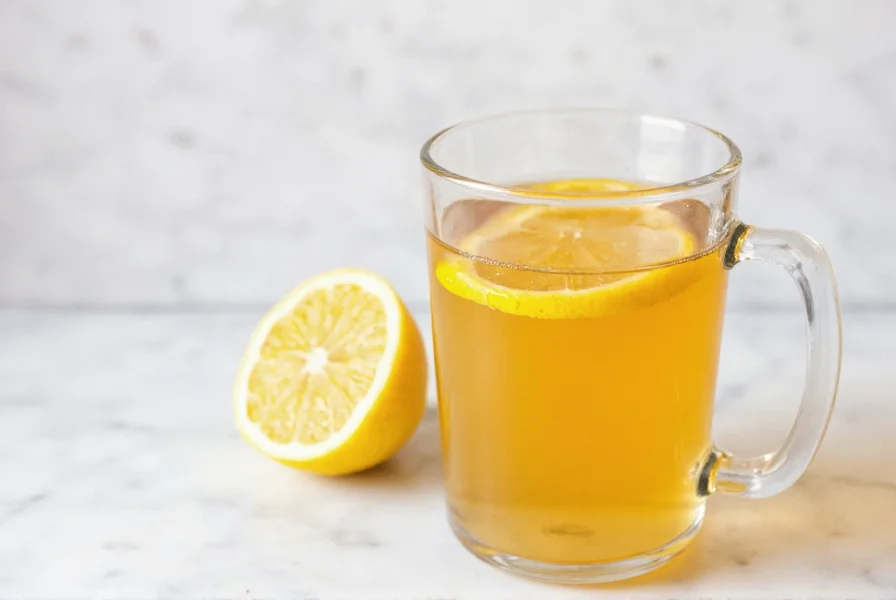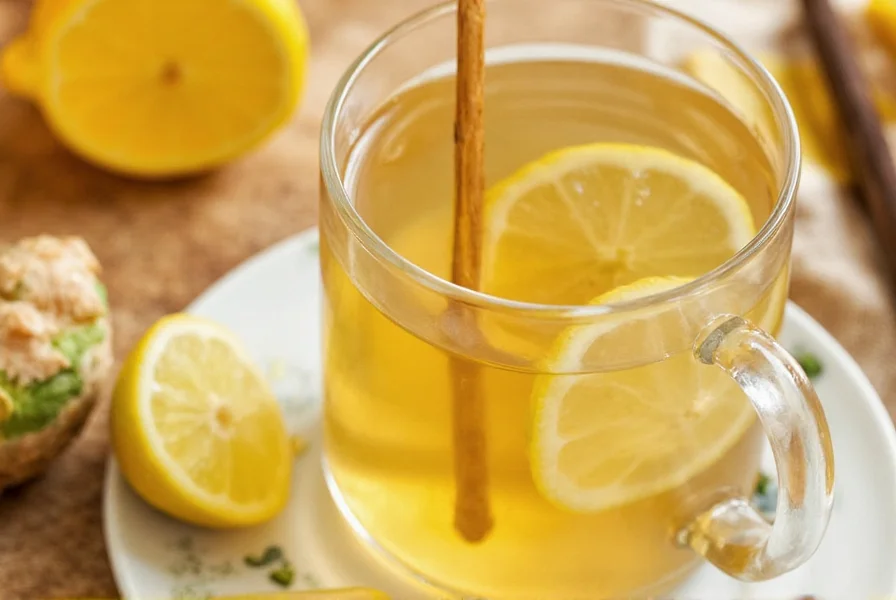Nothing compares to a steaming cup of homemade lemon ginger tea when you need comfort or a natural boost. This timeless combination harnesses the zesty brightness of lemon with ginger's warming spice, creating a beverage cherished across cultures for centuries. Unlike store-bought versions loaded with preservatives, making your own allows complete control over ingredients and potency.
Why This Lemon Ginger Tea Recipe Works
The magic happens through proper ingredient ratios and preparation technique. Many online lemon ginger tea recipes either underutilize ginger or overdo the lemon, creating unbalanced flavors. Our tested formula ensures:
- Optimal ginger-to-water ratio for maximum flavor extraction without bitterness
- Precise simmering time that preserves vitamin C from lemon
- Flexible sweetness adjustment for personal preference
Understanding how to make lemon ginger tea properly transforms this simple beverage from merely drinkable to extraordinary. The key lies in ginger preparation—slicing rather than grating releases flavor gradually during simmering, preventing overpowering heat.
Simple Lemon Ginger Tea Recipe
This easy homemade lemon ginger tea requires just four ingredients and one pot. Follow these steps for perfect results every time:
| Prep Time | Cook Time | Total Time | Servings |
|---|---|---|---|
| 5 minutes | 15 minutes | 20 minutes | 1 serving |
Ingredients
- 1-inch piece fresh ginger, peeled and thinly sliced
- 1 cup (240ml) filtered water
- 1 wedge fresh lemon (about 1/8 of a lemon)
- 1 teaspoon honey or maple syrup (optional)
- Pinch of turmeric (optional for enhanced benefits)
Step-by-Step Instructions
- Prepare ginger: Peel and thinly slice fresh ginger. Slicing exposes more surface area than grating, allowing gradual flavor release.
- Simmer: Combine ginger and water in a small saucepan. Bring to a gentle boil, then reduce heat and simmer uncovered for 10-15 minutes.
- Strain: Pour through a fine mesh strainer into your favorite mug to remove ginger pieces.
- Add lemon: Squeeze fresh lemon wedge directly into the tea. Avoid adding lemon before simmering to preserve vitamin C.
- Sweeten: Stir in honey or maple syrup if desired. Turmeric adds anti-inflammatory properties but may slightly alter flavor.
- Enjoy: Sip while warm for maximum soothing effect.
Evidence-Based Benefits of Lemon Ginger Tea
While not a substitute for medical treatment, this natural lemon ginger tea preparation offers several wellness benefits supported by research:
- Digestive support: Ginger contains gingerols that may help accelerate gastric emptying and reduce nausea
- Antioxidant properties: Both ingredients provide antioxidants that combat oxidative stress
- Vitamin C boost: Fresh lemon contributes vitamin C, essential for immune function
- Hydration: Provides fluid replacement with added flavor, encouraging better hydration habits
Remember that lemon ginger tea for immunity works best as part of a balanced lifestyle, not as a standalone solution. The warmth and ritual of preparation also contribute to its soothing effects.
Popular Variations to Customize Your Tea
Once you've mastered the basic lemon ginger tea recipe, experiment with these adaptations:
- Cold relief version: Add 1/4 teaspoon cayenne pepper and extra ginger for congestion relief
- Detox blend: Include 1 teaspoon chopped mint leaves and a cinnamon stick during simmering
- Iced tea option: Double the recipe, cool completely, and serve over ice with lemon slices
- Golden milk tea: Add 1/4 teaspoon turmeric and a pinch of black pepper for enhanced absorption

Troubleshooting Common Issues
Even simple lemon ginger tea recipes can encounter problems. Here's how to fix them:
- Too spicy: Reduce ginger amount next time or shorten simmering time. Adding honey can balance heat.
- Too weak: Increase ginger quantity or extend simmering time up to 20 minutes for stronger flavor.
- Bitter taste: Avoid boiling ginger vigorously—gentle simmering prevents bitterness. Remove ginger after 15 minutes.
- Cloudy appearance: This is normal with fresh ingredients and doesn't affect taste or quality.
Storage and Reheating Tips
For lemon ginger tea preparation efficiency:
- Store freshly made tea in a sealed glass container in the refrigerator for up to 3 days
- Freeze in ice cube trays for quick single servings—thaw cubes in hot water when needed
- Reheat gently without boiling to preserve vitamin content
- Never store with lemon already added—add citrus fresh when serving
Frequently Asked Questions
How much ginger should I use in lemon ginger tea?
For a single serving, 1-inch of fresh ginger (about 15g) provides optimal flavor without overwhelming heat. Adjust to taste—some prefer milder (1/2 inch) or stronger (1.5 inches) versions. Always slice rather than grate for controlled flavor release during simmering.
Can I make lemon ginger tea without honey?
Absolutely. Honey adds sweetness but isn't essential to the recipe. Many enjoy the natural tartness of lemon with ginger's spicy warmth. For sugar-free sweetness, try a few drops of stevia or omit sweetener entirely—the ginger's natural compounds provide subtle sweetness when properly simmered.
When is the best time to drink lemon ginger tea?
Morning consumption may support digestion and provide gentle energy, while evening servings can promote relaxation. Avoid drinking immediately before bed if ginger affects your sleep. Many find it particularly soothing when feeling under the weather or after meals for digestive support.
How long should I simmer ginger for tea?
Simmer sliced ginger for 10-15 minutes for balanced flavor. Shorter times (5-7 minutes) yield milder tea, while longer simmering (up to 20 minutes) creates stronger, more medicinal-tasting tea. Never boil vigorously, as this can make the tea bitter. The ideal time depends on your ginger variety and personal taste preferences.
Can I use ground ginger instead of fresh?
While fresh ginger delivers superior flavor and potency, you can substitute 1/4 teaspoon ground ginger per 1-inch fresh piece. Add ground ginger at the end of simmering since it extracts quickly. Note that the resulting tea will have different flavor compounds and potentially less digestive benefit than fresh ginger preparations.











 浙公网安备
33010002000092号
浙公网安备
33010002000092号 浙B2-20120091-4
浙B2-20120091-4